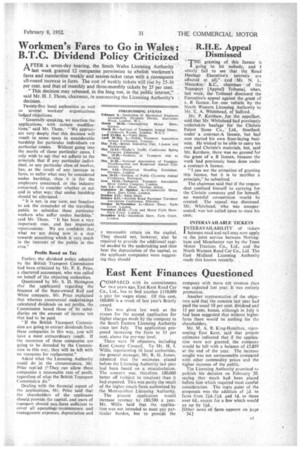Workmen's Fares to Go in Wales : B.T.C. Dividend Policy Criticized
Page 35

If you've noticed an error in this article please click here to report it so we can fix it.
AFTER a seven-day hearing, the South Wales Licensing Authority last week granted 12 companies permission to abolish workmen's fares and standardize weekly and season-ticket rates with a Consequent
all-round increase in fares. The cost of weekly tickets will rise by 25-30 per cent. and that of monthly and three-monthly tickets by 25 per cent.
• "This decision may rebound, in the long run, in the public interest," said Mr. H. J. Thom, chairman, in announcing the Licensing Authority's decision.
Twenty-five local authorities as well as several workers' organizations lodged objections.
"Generally speaking, we sanction the applications, with certain modifications," said Mr. Thom. "We appreci-ate very deeply that this decision will resultin some cases in considerable hardship for particular individuals en particular routes. Without going into the merits of those particular Cases, only wish to say that we adhere to the principle that if any particular individual, or any particular class of worker, has, as the result of any increase in fares, to suffer what may be considered undue hardship, then it is for the employers concerned, or the industry concerned, to consider whether or not and in what way; that undue hardship should be alleviated.
"It is not, in our view, our function to ask the remainder of the travelling public to subsidize these particular workers who suffer undue hardship." said Mr. Thom. "It has been a very important case, and has important repercussions. We are confident that, what we are• doing now is a step towards something which is very, much in the interests of the public in this area."
Profits Based on Tax
Earlier, the dividend policy adopted by the British Transport Commission had been criticized by Mr. P. E. Price, a chartered accountant, who was called on behalf of the objecting authorities.
Questioned by Mr. S. D. Herington (for the applicants) regarding the finances of the State-owned Red and White company, Mr. Price explained that whereas commercial undertakings calculated dividends on net profits, the Commission based those of its subsidiaries on the amount of income tax that had to be paid.
If the British Transport Commissioii are going to extract dividends froM these companies in this way, you will Rave a most extraordinary result. If the resources of these companies are going to be denuded by the Commission in this way, they will be left with no resources for replacement."
Asked what the Licensing Authority could do in the circumstances. Mr. Price repled :" They can allow these companies a reasonable rate of profit, regardless of what the British Transport Commissien do."
Dealing with the financial aspect cf the applications, Mr. Price said that the shareholders of the applicants should provide the capital, and users of transport should pay fares sufficient to cover all operating, maintenance and management expenses, depreciation and
a reasonable return on the capital. They should not, however, also be required to provide the additional capital needed by the undertaking and then bear the depreciation of the capital, as the applicant companies were suggesting they should




























































































